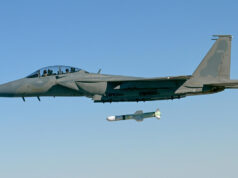A Defence Committee report has examined the allegations made by The Times in its investigation into the F-35 programme and has compiled a list of recommendations.
The committee say that their report has drawn on the work of other studies into the programme, such as the 2016 Annual Report of the US Department of Defense’s Director of Operational Test and Evaluation, and on the oral and written evidence they have gathered over the course of the inquiry, including from both Lockheed Martin and the Ministry of Defence.
Overall, the report concludes that:
The MoD’s acknowledgement of the potential value of using the Multifunctional Advanced Data Link (MADL) for secure communications between the F-35 and legacy aircraft is welcome. Without such a link and translation node, the UK will be underusing one of the key capabilities of the F-35 and we recommend that the MoD make provision for the procurement of a gateway translation node for MADL-based F-35 to Typhoon communication (Emphasis added throught—Ed.) in the next Equipment Plan.
The broadband capacity on the Queen Elizabeth carriers will need to be beyond the reported limit of 8 megabits, and, in all likelihood, in excess of the 32 megabits currently available on the USS America, if the potential benefits of the F-35 to the UK’s future carrier strike capabilities are to be realised.
The assurances from Lockheed Martin and the MoD about the rigorous level of cyber-testing of the ALIS software are welcome, as is the assurance from Lockheed Martin that the UK will have complete and unfettered use of the software for the sovereign operation of our F-35 fleet. However, we ask for greater clarity from Lockheed Martin on the level of protection in place for the technical data gathered by ALIS in relation to the UK’s F-35 fleet, including whether this data falls within the US Government’s ‘unlimited rights license’.
The MoD’s failure to provide adequate cost estimates for its procurement of the F-35, either on an overall programme basis or on a per-aircraft basis, is wholly unsatisfactory and this unacceptable lack of transparency risks undermining public confidence in the programme. We recommend that the Department provides us with the ‘rough orders of magnitude’ it claims to possess for the total costs of the programme beyond 2026/7.
The F-35 has clearly experienced a number of software and hardware problems during its development phase, as might be expected from a project of this scale and technical complexity.
However, The Times’s investigation has provided cause for concern and these concerns were not alleviated by the disappointing nature of the initial responses from Lockheed Martin and the MoD.
During our inquiry, we received a number of assurances from the Government and Lockheed Martin that the issues with the programme that have been previously identified either have been, or are in the process of being, resolved. For the time being, we are willing to accept these assurances.
The F-35 is a major investment in defence capability for the UK and we want it to succeed and become the cornerstone of a new and effective strike capability for this country. However, it is precisely because this project is so important that it must be subjected to the closest possible scrutiny.
We, therefore, recommend that the MoD provide the Committee with six-monthly updates on the programme, detailing the progress made in addressing the issues that have been previously identified, as well as any future problems. We also believe that these updates should include information on the ongoing cost of the programme.”
Click here to read the full conclusions and recommendations section of the report.














Well done. It is becoming more vital every day that each project for the M O D achieves maximum potential at the best possible cost.
I agree Geoffrey.
I’d only caution that what the DSC recommends is not often acted on by the MoD.
We can hope they take heed. MoD badly needs to get it’s act together.
They need some teeth
I would really like to see a pre-defined % of GDP be ring fenced by law (as is the case for Foreign aid) and for a cross party DSC provide oversight and scrutiny over this budget to ensure continuity of spending priorities, political commitment no matter what government is in power and to act as a balancing force between what the government of the day wants to achieve and the capabilities and funding required to do this.
This would mean the Defence committee becomes the custodian of defence and the Minister for defence has the operational role. It should also mean that outside of standing commitments and day to day activities, that the government of the day should provide the funding from outside this defined budget for non – core actions such as Syria, Bosnia, Iraq etc. which may act as some sort of check mechanism to get them think before they fire billions of pounds worth of munitions and put lives at risk.
The NAO have a critical part in this as their reports once accepted but he DSC must be acted upon and also must have serious implications for senior leaders within the force. This will bring about some much needed focus.
I really hope Gavin Williamson is successful in his role and also hope he improves the long term governance of this department.
I do not see other people in other countries blaming their “foreign aid” departments. Why no one blaming Dutch, Nordic, French, German, Australian, Kiwi and best US Foreign Aid the largest donor in terms of budget? Blame only DFID you stupid Brits!
Pacman27 – I agree with your % notion of it being decided by Parliament and enacted as is the DFID budget. But I do have to gently point out some issues with your ideas on the DSC.
The DSC is already a cross party committee that reflects the constituent party numbers in the House of Commons within its members. It is one of the strengths of the Select Committee system. To somehow turn its scrutinising brief into some executive role actually goes against Parliamentary Sovereignty. The Executive (Government) makes the decisions and carries out policies according to (initially) its election Manifestos and progressively as events unfold and Parliament scrutinises the Executive’s actions (and resulting consequences). And if you think some Committee of disparate political parties will ever agree on anything that means spending money in an efficient manner you have a different take on Real Politik than I do. That is why the Ministerial system is so effective. It makes decisions and then has to answer for them to Parliament afterwards.
Can I give an example of how this wouldn’t work in practice? If you look at the Select Committee on Brexit (BSC) they would be doing the negotiating with the EU and Davies would be some messenger boy. Given the bias in the BSC towards Remain we would never leave the EU in defiance of that June 2016 Referendum. Whereas we have a team of negotiators led by the PM and DD who then have to answer to, but are not instructed by, the BSC.
Say the DSC were of the anti-nuclear persuasion while the Government of the day were pro?
What you describe is what paralyses US politics and creates the ‘Pork Barrel’ payoffs we see there. And the outcomes in costs and inefficiencies are way worse than here. Witness the A330 MRTT debacle where the USAF were denied the best air tanker by a committee ‘on the Hill’.
The manifesto and Executive actions are important for another reason: The House of Lords are unelected and accountable to no one. We therefore have The Parliament Act and within that The Salisbury Convention which dictates that while the Lords can discuss and do whatever, they cannot defy the ultimate will of the House of Commons and cannot deny a Bill resulting from an election Manifesto as the events over the Article 50 Bill showed. They can of course deny contentious Secondary Legislation (as Osbourne found out).
Chris
I agree with your comments and am not suggesting the CDSC takes over decisions on an operational level. What I am suggesting is oversight with Teeth and an intermediary between the constant over commitment of resources allied to underfunding and poor management.
We need something that involves long term planning, budgeting and commitment and I think a new way of doing things may work.
The trick will be to get the long term governance and budgets in place whilst ensuring government has the ability to use the force as it sees fit within clearly defined parameters.
Pacman27 – I think we have that with the Chiefs of Staff who should be performing that role of making sure the political people don’t over commit or under fund the Forces. Yes they are ‘vested interests’ but they are the military specialists whose job it will be to fight the wars. The role of the SoS is to fight the political wars in the trenches of Westminster and Whitehall to meet the criteria of the Chiefs of Staff. Maybe THAT is where the teeth need placing. Not more teeth in the hands of a diverse politicians.
Chris
Understood, but I dont think they are doing their jobs unfortunately and it has become all too comfortable.
Brigadiers and above should be banned from working within the defence industry upon retirement or leaving the force.
And it is clear that its all just a bit too cosy – just look at what commodore peach has said upon leaving his current post, but not a word previously, same for Zambellas.
We need something more – each year the NAO and DSC give the MOD a kick in, and each year they are (mostly) ignored.
The US system would seem to work better than ours in terms of Defence at least and I think we should adopt something similar (but in a very British way) for the Business and Industry, the NHS, Law and Order, Education, Social Services and Defence. All areas bedevilled by self regulation, inefficiencies and most importantly a clear lack of strategic direction.
Too many changes and too much salami slicing – we need a 20 year vision not a 3 year survival plan… and that seems to be how our governments work.
UK should just have one single force filled with nuclear weapons.
Agree defence budget should be declared in law like foreign aid and increased to 3% immediately with a transition to 4% over the next 5-6 years.
Also remove nuclear deterrent costs from defence budget that should sit in its own budget funded directly by central government.
Has defence budget ever been uplifted since Osbourne’s ” creative accounting” when he moved nuclear deterrent into core defence budget? Answer is no!